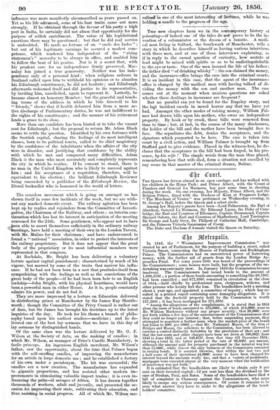Two new chapters have we in the contemporary history of
poisoning—if indeed one of the tales do not prove to be the in- vention of a calumniator or the dream of a lunatic. A medi- cal man living in Salford, the Southwark of Manchester, tells a story in which he describes himself as having various interviews with three men, and at one of those interviews explaining, as if in reply to the casual question of curiosity, how acetate of lead might be mixed with spirits so as to be undistinguishable to the eye or taste. One of the men insured the life of his father ; the father died "of drinking whisky " ; the son claimed the money, and the insurance-office brings the case into the criminal courts. It is an incident in this case, that the agent of the insurance- office is charged by the medical man with having talked of di- viding the money with the son and another man. The case comes out at the moment when anxious questions are asked whether these dealings in insurance are frequent'?
But no parallel can yet be found for the Rugeley story, and the lait incident excels in moral horror any that we have yet had. Amongst the other modes of raising money, William Pal- mar had drawn bills upon his mother, who owns an independent property. By. hook or by crook, those bills were renewed from time to time ; but, at last, in the course of the many disclosures, the holder of the bill and the mother have been brought face to face. She repudiates the debt, denies the acceptance' and the signature which purported to be hers. The case is taken into court by a civil action, and William Palmer is brought up from Stafford gaol to give evidence. Placed in the witness-box, he de- clares that the acceptance to the bill had been forged, in his pre- sence, by his wife ! The simple words from the man thus placed, remembering how that wife died, form a situation not excelled by any scene in that master of the criminal drama, Balzao.


























 Previous page
Previous page